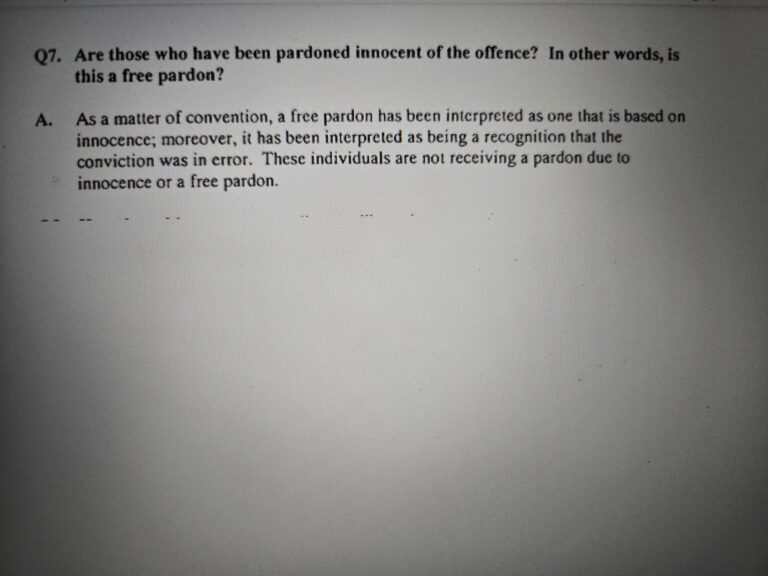Current Legal Issues
This section will include my comments and news reports on various current legal issues which interest me. The question of whether our court system is as efficient as it needs to be to maintain a high level of public trust and support is one of several important issues of interest.
Simply stated, laws are the rules we live by which will be enforced by state power. This is done by court orders directing that individuals be imprisoned, or otherwise punished, in criminal cases or have their money and property taken from them to satisfy civil judgments such as the awarding of money for harm they have caused to others. Courts and the law work most effectively when people have a very high level of trust in law makers, law enforcement and the courts to do the right thing. This section will focus on issues that show how difficult it can be to use the law to “do the right thing” in the real world.
It is often said that “justice delayed is justice denied”. While the courts and law enforcement have never operated as quickly as some might like, others prefer to postpone the day of judgment for as long as possible. Delay can be a winning strategy in a case otherwise bound to lose. There are virtually no consequences that may fall on the party creating and benefiting from delay in the judicial process today.
There are ways of moving cases forward far more quickly than the legal process permits. Major commercial disputes are usually resolved in private arbitrations which can be finalized quickly to meet the needs of the business interests involved in the dispute. However, there is little that can be done to speed up the civil litigation process in Canada when the party being sued wants to create delay because that party has no viable defense. Even when a matter has been adjudicated upon by a court following a trial, various appeals are usually available which can easily consume several more years even when the appeal has no merit.
Some U.S. jurisdictions do have a mechanisms that can move things along. In one of the many cases facing him former U.S. President, Donald Trump, has been ordered to post a very large security bond for the amounts he has been ordered to pay by juries if he intends to appeal those decisions. This is intended to discourage appeals on weak grounds. However, he has disputed the amount and the procedures for posting this bond thereby creating further delay. His efforts to delay the legal process in all the legal actions involving him are now a factor in the upcoming election for the office of President of the most powerful country on the planet. While the Trump example provides a very colorful and entertaining spectacle I intend to focus on cases closer to home where meritless delay tactics create real injustice and undermine our faith in the law.
TO BE CONTINUED…..
The Rule of Law is a Very Fragile Thing
People in real democracies are governed by the rule of law and not by the rule of a king or dictator. That is, we in Canada are required to guide our conduct by the laws established by a democratic process after open debate in an open Parliament. We are not governed by the arbitrary wishes of an individual with complete discretion to make any decision they want. Human nature being what it is, it is not an easy task to identify the precise boundaries of the law but there are boundaries and their exact location is decided on a case by case basis in our courts under our common law system or under a statute enacted by Parliament. In a democracy we establish our laws through a democratic process in which law makers are accountable to voters who have selected those law-makers through free and fair elections. Government authority rests on our consent. Each person has one vote and the laws apply to all equally. However elections create minorities. Now we get to the hard part. These minorities have to accept and respect the laws established by the majority. When people are not willing to act lawfully a democracy breaks down.
The most famous recent breach of the rule of law was triggered by then president Trump when he incited a crowd of his supporters to attack the US Capitol Building on January 6, 2021. Recent Canadian history does not provide similarly glaring and extreme examples of the breach of rule of law. However examples can easily be found. I refer elsewhere to the southern Alberta farmers who went to jail for filing false customs documentation to facilitate the export of wheat contrary to the Wheat Board Act. Those farmers, egged on by Stephen Harper, then President of the National Citizens Coalition, refused to pay the fines assessed for their breach of the Customs Act and subsequently spent time in jail. The activities around these breaches of law and the surrounding publicity provided Stephen Harper with the national platform on which he started his political career.
Harper was finally, after 15 years, able to repay his political debt to the farmers who were imprisoned by granting them “pardons” in a well publicized ceremony on August 1, 2012. The following Buzzfeed article by Lois Ross published several years later after deep research explains;
Posted on Aug 21, 2015
The Inside Story Of the Conservatives' Controversial Decision To Pardon 10 Farmers
New documents show frustrated bureaucrats didn't know who or what they were pardoning until until the last minute. One high-level public servant says the debacle pushed her to eventually leave her job.
by Emma Loop BuzzFeed News Reporter, Canada
Stephen Harper has presented himself as a champion of tough-on-crime politics. “Proven leadership for a safer Canada,” the blue-toned wrap on his campaign bus says in bold.
There was one time, though, when the prime minister loosened the grip of the law on a group of offenders.
In August 2012, Harper announced that the Conservative government had officially dismantled the Canadian Wheat Board, a federal agency that brokered export deals for barley and wheat farmers. He also made the surprise announcement that he was unsheathing "an ancient power" to pardon a group of farmers who had, as Harper said, simply been protesting the monopolistic nature of the Wheat Board.
"These people were not criminals," Harper said.
Some members of Farmers for Justice, as the small group called itself, were charged under the Customs Act for trying to bring their grain to the United States illegally. Some spent time in jail for refusing to pay the resulting fines.
The government would later say that it had granted the farmers an "ordinary pardon," a rarely used form of clemency under the Royal Prerogative for Mercy.
At the time of the announcement, tens of thousands of traditional pardon requests sat unanswered in a backlog of the Conservative government's own creation.
The pardoned farmers couldn't all be identified at the time because of privacy laws. Recently, the Parole Board of Canada revealed that 10 farmers received pardons.
The farmers who came forward on their own accord, though, expressed immense relief at having their records sealed.
But questions lingered about the way in which the government went about granting the pardons.
Now, for the first time, documents obtained by BuzzFeed Canada show the prime minister's hand in having the farmers pardoned, and how some officials — including the public safety minister — pushed back.
The law states that anyone who wants a pardon — now called a record suspension — must apply to the Parole Board of Canada and pay a $631 fee.
Clemency is more typically used to clear the records of those who were wrongly convicted. But in very rare cases, the governor general, on recommendation of the public safety minister, can grant it to deserving applicants who've exhausted all other legal remedies.
The farmers had applied for neither a record suspension nor clemency. Political offices approached them, asking if they wanted it.
One high-level bureaucrat involved in the pardons told BuzzFeed Canada that the process blurred the lines between public service and politics.
"I found it very distressing," said Mary Campbell, who retired as director general of corrections and criminal justice in 2013.
Campbell said it pushed her to leave Public Safety Canada after serving for nearly three decades.
"This was a situation that went very close to the line of the instructions being difficult to accept," she said in an interview.
Hundreds of emails and documents obtained through access to information laws show bureaucrats from at least seven government departments and agencies struggled to make the pardons happen while battling a void of information, multiple legal hurdles, and political pressure to have it done before the prime minister's announcement.
This is an inside look at the messy, politicized process that led to the pardons.
November 23, 2011: Saskatchewan MP David Anderson sends a letter to Harper after speaking with him a month earlier at Question Period practice.
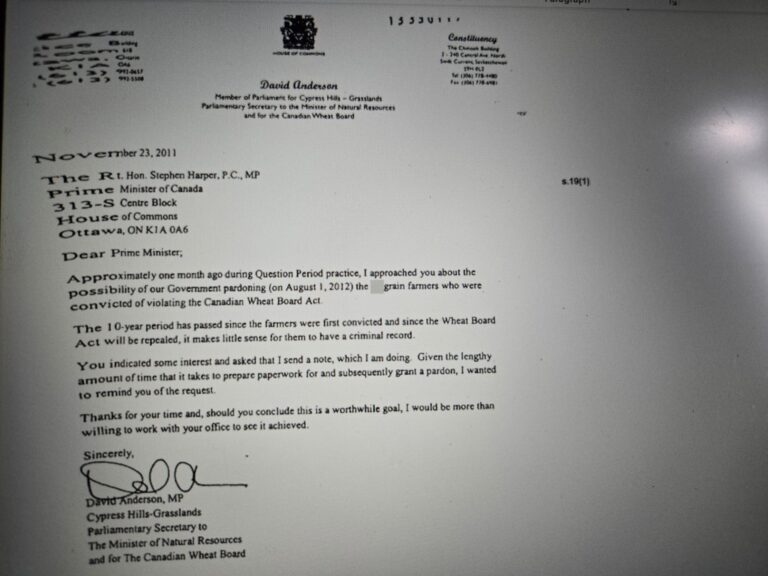
BuzzFeed Canada
“I approached you about the possibility of our government pardoning (on August 1, 2012) the [REDACTED] grain farmers who were convicted of violating the Canadian Wheat Board,” the letter reads. "The 10-year period has passed since the farmers were first convicted and since the Wheat Board Act will be repealed, it makes little sense for them to have a criminal record."
December 21, 2011: "David, Keep reminding me about this!" the prime minister writes at the end of his response to Anderson.
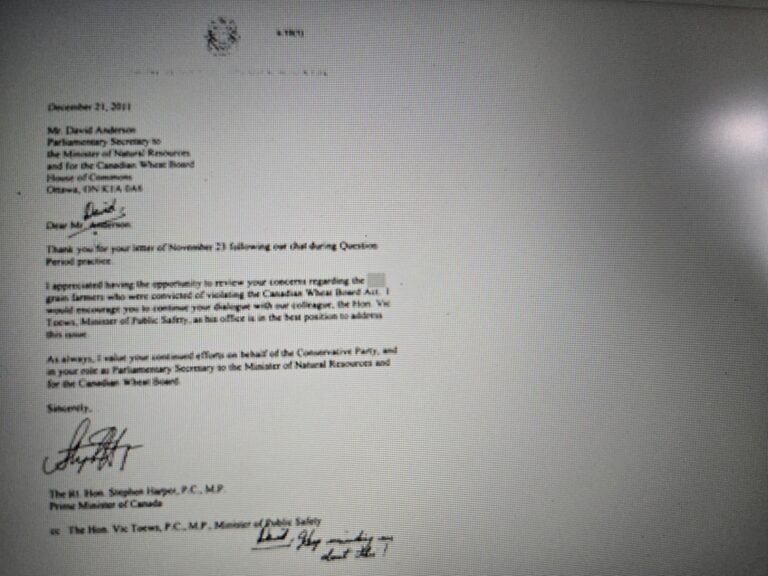
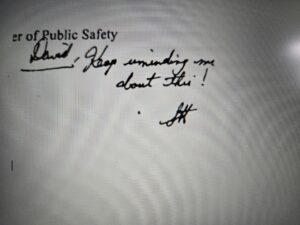
Harper's connection to the farmers goes back to his days as the head of a lobby group called the National Citizens Coalition.
“Harper loved the anti-government style of the Farmers for Justice,” farmer Henry Kuhl told the Globe and Mail. “And he could smell votes.”
Five months later: Then-Public Safety Minister Vic Toews seems to shut the idea down. He writes Anderson a letter saying that anyone who wants a pardon must apply for it: "The eligibility criteria for a pardon is a matter of law."
"As you may know, the Parole Board of Canada (PBC) is an independent administrative tribunal with the exclusive authority for making pardon decisions under the Criminal Records Act (CRA)," the letter reads.
Early July 2012: "Grain Marketing Freedom Day," as the Tories would dub it, is less than a month away. Despite Toews' letter two months earlier, word has come down to public servants that the farmers must be pardoned — and fast.
Asked about the sudden change in direction, Campbell pointed to the Prime Minister's Office's control over federal institutions: “It’s perhaps more apparent given what has been coming out in the last week or so at the Duffy trial...that PMO exercised a lot of authority."
July 12: The bureaucrats are confused as to what kind of pardon they're supposed to be pursuing, since the farmers don't qualify for a "free pardon" — a declaration of innocence.
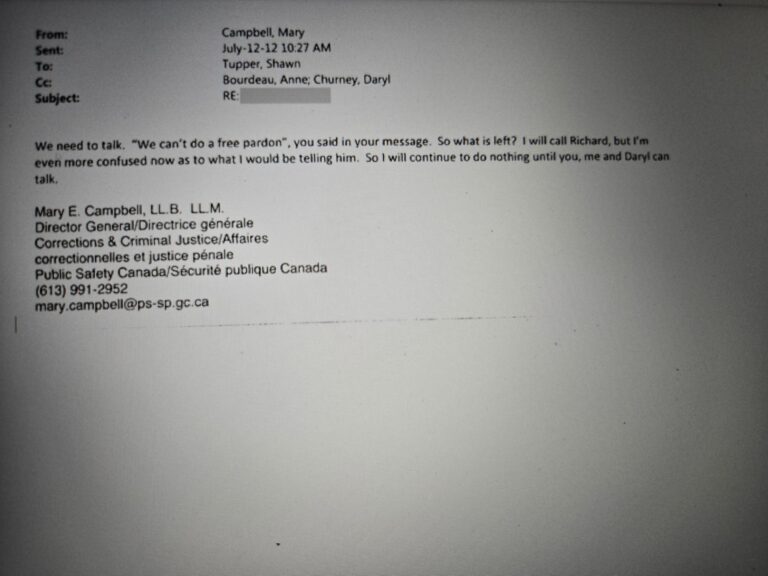
BuzzFeed Canada has learned that officials initially told the government that a record suspension would be the most appropriate for the farmers, but that those above rejected the idea, saying the word "pardon" must be used.
Lengthy, highly redacted correspondence between senior lawyers at Public Safety Canada, the Department of Justice, Privy Council Office, the Parole Board of Canada, and the RCMP continue throughout the month.
July 13: Public servants are frustrated they still don't know who they're supposed to be pardoning. "Someone, somewhere has to provide us with the actual names and birthdates of the individuals," writes Richard Clair, an executive at the parole board.
Since none of the farmers applied for the pardons, the minister's office is responsible for finding and providing the farmers' information.
Three days later, Tom Jarmyn, a lawyer working in Toews' office, provides some, but not all of the names.
"PBC is still struggling with process," Campbell responds.
July 19: The bureaucrats still don't know which offences they're pardoning.
Without the names and birthdates of the offenders — or their consent — no one has been able to search CPIC, a national police database.
"Time is extremely short and the Board cannot do what it needs to do without knowing we have the consent of the [REDACTED] to do the CPIC check to verify their records (otherwise we don't know what we're pardoning)," writes Daryl Churney, director of corrections policy at Public Safety Canada.
A parole board employee notes that the charges might not even show up in CPIC, since they're not criminal. Emails suggest that was the case: The RCMP had to resort to searching small police detachments for the records, since they showed up neither in the force's own national database nor CPIC.
July 20: "Honestly I wish I could change the channel, as I'm sure you do too," Churney writes to a colleague at the parole board.
Churney laments that the farmers will be giving verbal consent, "but at this point I think we have to take what we can get."
In the days that follow, the proposal is en route to the minister — but not all the farmers are getting pardons.
"The Minister's Office received verbal consent to proceed with everyone on the list for the above-noted pardons but [REDACTED]," notes one email. "Please complete the process forthwith for the remaining [REDACTED]."
Campbell told BuzzFeed Canada there were three farmers who "were disqualified for various reasons."
"Of course, when you're issuing any kind of pardon, you want to be very careful about what part of the record, if there's more than one part, that you are pardoning," she said. "There were apparently some issues around that."
July 27: A communications manager at Public Safety Canada sends Toews' office talking points for the prime minister, to be approved by his office and PCO.
